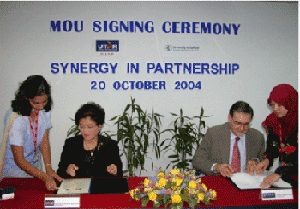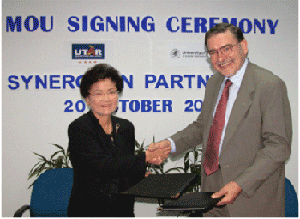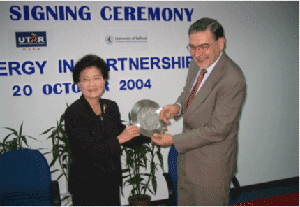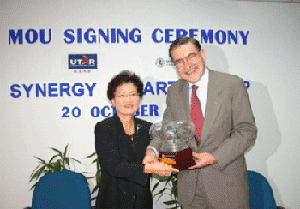
IN THE PRESS
|
20 October 2004
UTAR strengthens links with Salford University  The Signing of the UTAR - University of Salford MOU Documents  Tan Sri Dr Ng Lay Swee, President/CEO of UTAR exchanges signed MOU documents with Professor Michael Harloe, Vice Chancellor of the University of Salford  Presentation of souvenir to Professor Michael Harloe by Tan Sri Datuk Ng Lay Swee  Presentation of souvenir to Tan Sri Datuk Dr Ng Lay Swee by Professor Michael Harloe On 20 October 2004, UTAR, represented by its President/CEO, Tan Sri Datuk Dr Ng Lay Swee, signed an MOU with the University of Salford, United Kingdom, represented by its Vice Chancellor, Professor Michael Harloe with an intent to explore collaborations in research and academic development between the two universities. It was a very meaningful ceremony for both institutions. The University of Salford's links with UTAR go all the way back to the pre-UTAR days in Kolej Tunku Abdul Rahman (KTAR). In fact, KTAR staff had been sent to study in the University of Salford under staff development programmes and a Salford Professor had been appointed an External Examiner of UTAR. Said Professor Harloe, "When UTAR was inaugurated in 2002, the University of Salford was proud to put on record its best wishes for UTAR's future, having been involved with KTAR over a number of years." He added, "The University of Salford has chosen to only sign a small number of MOU's, and when we do sign, it is with institutions whom we believe offer the greatest potential for successful, fruitful partnerships, which will be of mutual benefit to both parties." Tan Sri Datuk Dr Ng welcomed the strengthening of ties between the two institutions. She said that the MOU "bears great significance" as it "signals an intention, a readiness in both our universities to work together on an institution-to-institution level." "Like Salford University, UTAR is constantly evolving with the times and is open to new ideas and strategies. We believe that to cope with a changing world, an entity must develop the capacity of shifting and changing - of developing new skills and attitudes; in short, the capability of learning." She also paid tribute to Salford University's foresight in organising a research conference with the theme 'Developing World Class Research - a Malaysian Perspective', one of the earliest such conferences organised by a British university in Malaysia. She noted how in February of this year, Salford University 'shared their ideas and achievements on informatics research and built environments' in a highly successful UK-Malaysia Partnerships Conference in Kuala Lumpur. "These well-known areas of strength in Salford University will certainly provide a good starting point for our staff to look into for co-operation and working together," she observed. The University of Salford is internationally recognized as an enterprising university and was the first university to establish 'Academic Enterprise', which seeks to harness the university's creative strengths to foster wealth creation and generate social well-being. Their rating under the UK Research Assessment Exercise 2001 accorded them the highest possible score in the fields of Built Environment and Information Management. |














